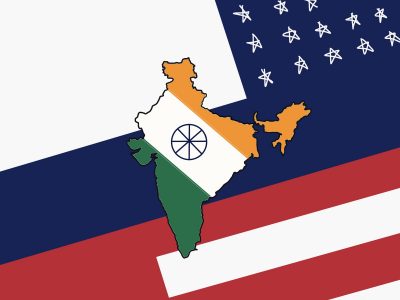As the invasion of Ukraine enters its second month, the war’s reverberations are being felt globally.
Energy markets are already feeling the effects of sanctions on Russian oil and gas, and other commodities may be subject to similar shocks too. Russia and Ukraine supply more than a quarter of the world’s wheat, putting food prices at risk of rising. So much so, that some countries, such as Egypt, have already made moves to ramp up domestic wheat production in preparation.
However, disruptive as they are, these are only the first spillover effects to come from the conflict. Just like how economic relationships and supply lines are being redrawn, political relationships too, will eventually need to be reinspected.
Earlier this month, at the UN General Assembly, the invasion of Ukraine was widely denounced by the international community. Though only five nations voted against the resolution – which called for Russia to “immediately, completely and unconditionally withdraw all of its military forces from the territory of Ukraine within its internationally recognized borders” — there were a few notable countries that withheld condemnation.
Most interesting of which is India, which just recently strengthened its relationship with the U.S. through the Quadrilateral Security Dialogue, or the “Quad.”
The “Quad” was formed in 2007 and consists of India, Australia, Japan, and the U.S. It has recently come to prominence due to unanimous concerns over China’s growing regional and economic power, and serves as a strong platform for bilateral cooperation between the U.S. and India.
Though U.S.-India relations had been harmed in the past by the former’s friendliness with Pakistan during the Cold War, countering Chinese power has been enough of a platform to maintain a close partnership between the countries.
This is interesting, as concern over China is what initially prompted India to establish ties with Russia in the first place.

After its war with China in 1962, India moved towards the Soviet Union as a pragmatic action to address its regional concerns. For the rest of the Cold War, India became a reliable, stable partner of the Soviets. Even to this day, India still relies heavily on Russia for weapons systems, with its recent plans to acquire the brand new Russian S-500 missile system being the latest purchase to raise American eyebrows.
Although India’s ties to Russia have always been to the dismay of the U.S., the recent invasion of Ukraine has put a spotlight on this issue.
Continued imports of Russian oil and purchases of Russian weapon systems do not sit well with America’s new policy of making Russia a pariah in the international community. What was once a tenable position, walking the tightrope between the U.S. and Russia, no longer seems possible to hold.
Though India is yet to face any consequences, as it remains an important partner to both the U.S. and Russia, the pressure to choose a side is only going to grow.
India’s foreign policy has long favored global neutrality. Having its roots in the Non-Aligned movement of the Cold War, India’s partnerships and deals were made out of necessity and pragmatism, as India wanted to avoid being used to serve the interest of big powers.
Neutrality is a doctrine that has dictated India’s foreign policy for decades, and is now being put to the test by Russia’s invasion of Ukraine. India may no longer be able to sit out this conflict, as its future stake in global affairs is on the line.
























































































































